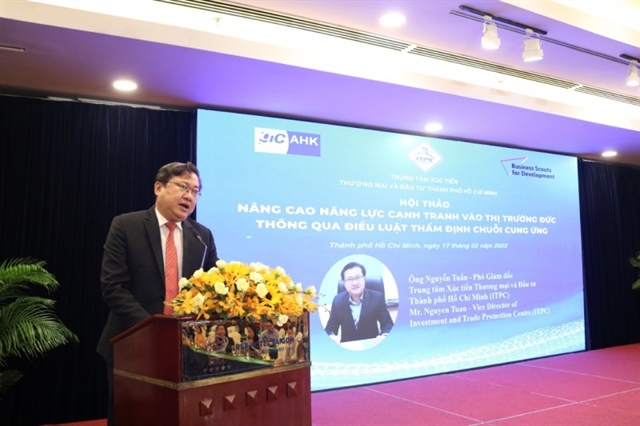Vietnamese enterprises need to improve their social and environmental performance to secure their position in global supply chains, a seminar heard in HCM City last week.

Vietnamese enterprises need to improve their social and environmental performance to secure their position in global supply chains, a seminar heard in HCM City last week.
Nguyen Ngoc Sang, project manager of the German Business Incubator at the Delegation of German Industry and Commerce in Viet Nam (AHK Vietnam), said in recent years Viet Nam had been a popular investment destination for many countries, especially Germany.
AHK Vietnam was receiving increasing requests from German companies to find suppliers in Viet Nam, he said while speaking at the seminar on enhancing Vietnamese companies’ competitiveness in global supply chains through compliance with the German Supply Chain Due Diligence Act.
With its geographical location, Viet Nam is considered the gateway to Southeast Asia, a rapidly growing and dynamic region, according to Sang.
It is attractive to investors thanks to its low labour costs, high labour compliance, strong growth for many years, and open mechanism for attracting investment.
It has signed many trade deals, including the EU-Viet Nam Free Trade Agreement, which gets much attention from European investors, including German, and enterprises seeking to diversify their supply chains also prefer the country.
According to Nguyen Tuan, deputy director of the Investment and Trade Promotion Centre of HCM City (ITPC), said trade and investment ties between Viet Nam and the EU, especially Germany, have seen robust growth in recent years.
Germany is Viet Nam's largest trading partner in Europe, accounting for more than 19 per cent of its exports and acting as the gateway for Vietnamese goods to enter other European markets.
While productivity and quality standards remain key factors, international business partners are increasingly looking at social and environmental conditions when choosing suppliers.
To ensure exports to demanding markets, Vietnamese enterprises must comply with stringent regulations like the German Supply Chain Due Diligence Act (LkSG).
Lanh Huyen Nhu, project coordinator for Sustainable and Climate Resilient Supply Chains at AHK Vietnam, said the act, which came into effect in January this year, sought among other things to prevent child and forced labour and ban substances that are hazardous to people and the environment.
"The law requires German companies to establish appropriate and effective risk management for their supply chains and integrate it into all relevant business processes," she said.
Companies in Viet Nam could be indirectly affected by these regulations if they are part of a supply chain of a German company.
According to experts, while due diligence in supply chains and the resulting obligations are not new, these standards are becoming even more relevant, requiring more initiatives from businesses.
Understanding and putting these requirements into practice would lower risks and strengthen their competitiveness in the global supply chain, they said.
The seminar was held by ITPC and AHK Vietnam. — VNS
- Tags
- German market





